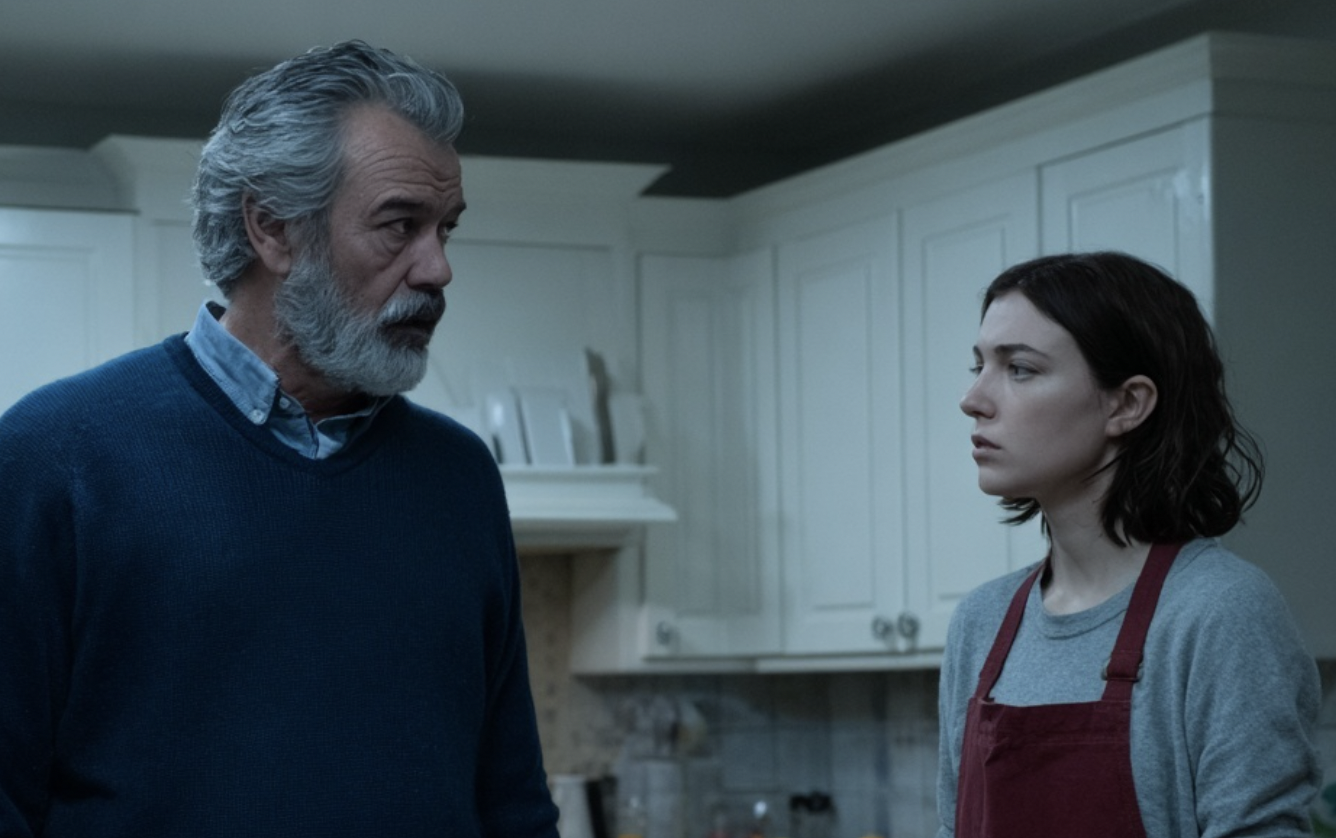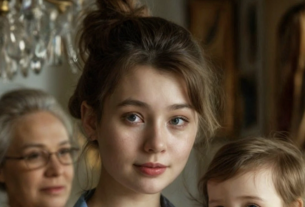Ira stood at the stove stirring borscht. Sasha paced back and forth across the kitchen.
“Salted it again!” He tasted it and grimaced. “How many times do I have to say it?”
“I didn’t oversalt anything.”
“What’s this then?” Sasha pointed into the pot with the spoon. “The Dead Sea?”
Ira clenched her teeth. Thirty years of the same thing. Something was always wrong with her.
“Add some water if it’s salty.”
“Add water!” Sasha slapped his palm on the table. “Or maybe you could finally learn how to cook?”
“Or maybe you can cook yourself?” The words burst out on their own.
Sasha froze. She’d never answered him like that.
“What?”
“Cook it yourself if you don’t like it.” Ira turned off the burner and faced her husband. “I’m tired of your complaints.”
“Oh, that’s how it is!” Sasha flushed. “So I’m the one who complains? And who sits at home all day? Who doesn’t bring any money into the house?”
“I work! I work at the school!”
“Pennies!” Sasha waved his hand. “What are they even good for?”
Ira felt her heart pounding. Nastyenka peeked out of her room and immediately withdrew. Smart girl.
“You know what?” Sasha headed for the bedroom. “I’m sick of all this!”
Ira heard him throwing things into a bag. Was he really going to leave? Usually, after half an hour he cooled down and came to make peace.
But not this time.
“I’m going to my mother’s,” he announced, standing in the hallway with his bag. “At least there they cook proper borscht.”
“Go.” Ira didn’t even step out of the kitchen.
Sasha lingered. He probably thought she would cry and start begging him to stay. Like before.
“Are you serious?”
“I am. Close the door behind you.”
The lock clacked. Ira sat down on a stool and stared at the pot. Well, that was that. Thirty years of marriage down the drain over borscht.
Nastya poked her head into the kitchen.
“Mom, did he really leave?”
“Looks like it.”
“What’s going to happen now?”
Ira looked at her daughter. Her eyes were huge, frightened.
“I don’t know, honey. I honestly don’t know.”
One thought kept beating in her head: should she have spoken up like that sooner—or never at all? And why didn’t she feel relieved, only empty?
The phone rang. Maybe Sasha had come to his senses.
“Ira?” Her mother-in-law’s voice was icy. “What are you doing to my son?”
“Good evening, Tamara Pavlovna.”
“What’s good about it? Sasha showed up all upset! Says you kicked him out!”
Ira closed her eyes. Here we go.
“I didn’t kick anyone out.”
“You didn’t? Then why is he here? He’s practically crying!”
Sasha crying. Ira pictured it and smirked.
“He left on his own, Tamara Pavlovna.”
“On his own! Of course, on his own!” Her mother-in-law was almost shouting. “You’ve driven the man to the edge! He’s put up with your whims for thirty years!”
“My whims?”
“Whose else? Something’s always wrong with you! You’re tired, your head hurts!”
Ira hung up. There was no point talking to her any further.
The next day at school her colleagues noticed right away that something was off.
“Ira, you look strange,” Lena said at recess. “What happened?”
“Sasha left.”
“Left how? Where to?”
“To his mother’s. We fought yesterday.”
Lena sat down beside her.
“A serious fight or the usual?”
“I don’t know. He took his things.”
“Oh, Ira… And you? Are you upset?”
Ira thought about it. Was she? Seemed like yes. But not like before. Before, she’d run to make peace at once, apologizing for everything under the sun.
“It’s strange, but not much. The silence at home is… unusual.”
“Maybe call him?”
“What for? He knows where to find me.”
Lena looked at her, surprised.
“You really have changed. Before, you would’ve called a hundred times already.”
“I’m tired, Lena. I’m sick of always being the guilty one.”
At home, Nastya met her with silence. The girl was clearly worried but didn’t want to talk. She sat down to do her homework and shut herself in her room.
Ira made dinner. She automatically set out three plates, then put one away. The kitchen felt oddly empty.
The second day passed the same way. Sasha didn’t call. Nastya went around sullen.
“Mom, is Dad coming back?” she asked at breakfast.
“I don’t know.”
“Do you want him to?”
Ira stopped with the cup in her hands. Did she?
“I do. But not the way he was.”
“What do you mean not the way he was?”
“You see, honey, I’ve been apologizing for every step for thirty years. I’m tired.”
Nastya nodded and said nothing.
On the third day, Tamara Pavlovna called.
“Ira, have you completely lost your mind? Sasha has been sitting here for three days!”
“So what?”
“What do you mean so what? He’s your husband! It’s your place to persuade him!”
“And his place is to reproach me for anything and everything?”
“A man has the right to demand order in the house!”
Ira laughed. Even she was surprised at her own laughter.
“Tell me, did you ask why your son left? What for?”
“Because of your character!”
“Because of borscht. Oversalted, in his opinion.”
Silence.
“Because of borscht?” the mother-in-law repeated.
“Because of borscht. And because for the first time in thirty years I didn’t agree that I was to blame.”
Tamara Pavlovna was quiet for a moment.
“Ira, maybe that’s enough foolishness? Come over and take your husband home.”
“I’m not coming. He can decide for himself where he wants to live.”
“You’ll lose him!”
“Maybe.”
On the fourth day Sasha called himself. His voice sounded tired.
“Ira?”
“I’m listening.”
“How are you?”
“Fine. Living.”
“And Nastya?”
“She’s living too.”
A pause.
“Maybe we should meet? Talk?”
“About what?”
“Well… we need to figure something out.”
“Figure it out. No one’s holding you.”
Another pause.
“Are you angry?”
Ira thought.
“No. I’m not angry. I just realized something.”
“What did you realize?”
“That I’m tired of being guilty of everything.”
Sasha sighed and hung up.
The fifth day started like any other. Ira was getting ready for school when the phone rang.
“Mom!” Nastya’s voice was scared. “Something’s wrong with me!”
“What do you mean wrong?” Ira dropped her bag and ran to her daughter.
Nastya stood in the hallway. Her face was swollen, her eyes barely visible, red blotches on her neck.
“Mom, I can’t breathe!”
Ira grabbed the phone.
“Ambulance? Quick! My daughter is choking, a severe allergy!”
While they waited for the medics, Nastya got worse. She sat down on the floor, wheezing.
“What did you eat? What did you drink?”
“Nothing special… I just tried a new cream…”
The ambulance arrived quickly. The doctor gave her a shot at once.
“We’re taking her to the hospital. Her condition is serious.”
Ira sat beside her daughter in the car. Her hands were shaking.
“Mom, what if I go away?”
“Don’t talk nonsense!”
“What if? Will you tell Dad that I loved him?”
Ira’s heart clenched.
“You’ll tell him yourself. Yourself.”
At the hospital they took Nastya to intensive care. Ira stayed in the corridor. Call Sasha or not? What if something happened?
She dialed her mother-in-law.
“Tamara Pavlovna, please get Sasha. They took Nastya to the hospital.”
“What?! What happened?”
“A severe allergy. Tell him to come.”
Sasha rushed in half an hour later. Pale, bewildered.
“Where is she? How is she? What do the doctors say?”
“In intensive care. We’re waiting.”
They sat side by side on the hard chairs. Silent.
“Because of what?” Sasha asked.
“Some new cream.”
“Foolish girl… She always tested first.”
Ira looked at her husband. He had aged over these days. Or had she only noticed now?
“Sasha, what if I hadn’t called?”
“What do you mean, hadn’t called?”
“Well, we aren’t talking. You left.”
Sasha rubbed his face with his hands.
“Ira, what does that have to do with it? Nastya…”
“It does. We split over borscht. And our daughter could have died, and you wouldn’t have known.”
He fell silent.
An hour later the doctor came out.
“Nastya’s parents?”
“Us!” they both jumped up.
“She’s fine. The danger has passed. But we’ll keep her overnight for observation.”
“Can we see her?”
“Of course.”
Nastya lay there pale, but her breathing was steady. She saw her parents and burst into tears.
“Dad, you came!”
“Of course I came, silly.”
Sasha sat down and took his daughter’s hand.
“You scared us.”
“I thought I would die. And that you wouldn’t make up.”
Ira sat on the other side.
“We’re not fighting, honey.”
“You are!” Nastya tried to sit up. “You’ve been silent for five days! You think it’s easy for me?”
“Nastya, calm down,” Sasha said.
“I won’t! I’m sick of it! You’re like children! You split up over some nonsense!”
Ira and Sasha exchanged glances.
“It’s not nonsense,” Ira said quietly. “Dad thinks I’m a bad wife.”
“And Mom thinks I’m a tyrant,” Sasha added.
“So what?” Nastya frowned. “You love each other!”
“How do you know?” Ira was surprised.
“I can see it! When Mom was sick in the winter, Dad didn’t sleep all night! And when Dad broke his arm, Mom stayed at the hospital!”
Ira remembered. True, she had stayed. And Sasha really hadn’t slept when she had a fever.
“Nastya, it’s not about love,” Sasha began.
“Then what is it about?”
“It’s that we forgot how to talk,” Ira said. “We only argue.”
Nastya closed her eyes.
“Then try a different way.”
Nastya dozed off toward morning. Ira and Sasha sat by her side all night.
“Want coffee?” Sasha asked. “I’ll get some from the machine.”
“Yeah.”
He left and came back with two cups.
“Probably tastes awful,” Ira said after a sip.
“No, it’s fine. No complaints.”
They were quiet.
“Ira, maybe she’s right? Nastya?”
“Right about what?”
“That we’re like children. We split over nothing.”
Ira looked at their sleeping daughter.
“Not over nothing, Sasha. Because you don’t respect me.”
“How do I not respect you?”
“You constantly criticize me. I cook badly, I clean badly, I work for pennies.”
Sasha set his cup on the floor.
“I don’t mean it in a bad way…”
“Then how? Thirty years, every day something’s wrong.”
“Mom always said…”
“Stop!” Ira turned to him. “What does your mother have to do with it? Are you living with me or with her?”
Sasha scratched the back of his head.
“Well… with you, I guess.”
“I guess? You spent five days at Mommy’s. Did you like it?”
“Honestly?”
“Honestly.”
“Awful. She treats me like a little kid. What to eat, what to wear, when to go to bed.”
Ira smirked.
“And at home, did I treat you like that?”
“No. At home you…” Sasha stopped. “At home you were my equal.”
“I was. Until you started trying to ‘teach’ me.”
Sasha was silent for a while.
“Ira, what do we do now?”
“I don’t know. If you want to come home—come. If you don’t—live with your mother.”
“Do you want me to come back?”
Ira looked at her husband. The tired face, the gray hair, the familiar hands.
“I do. But not the way you were.”
“How then?”
“As someone who respects me. Who doesn’t look for faults in everything.”
“And if I can’t?”
“Then you can’t. I won’t put up with it anymore.”
In the morning they discharged Nastya. The doctor said there was no danger now, but she should be more careful with cosmetics.
“Are we going home?” Nastya asked as they left the hospital.
“Of course,” Ira said.
“All together?”
Ira looked at Sasha.
“Dad will decide for himself.”
“I’m going,” Sasha said quietly.
At home he went into the bedroom and looked at his half of the closet.
“Ira, my things…”
“Right where they were. I didn’t touch anything.”
“Thanks.”
Ira made lunch. She automatically tasted the borscht—was it oversalted? Sasha came into the kitchen and tasted it too.
“It’s fine,” he said.
“Really fine, or are you afraid to say otherwise?”
Sasha looked closely at his wife.
“Really fine. Tasty, even.”
They ate in silence. Nastya picked at her food, glancing at her parents the whole time.
“So what, is it going to be like this now?” she asked. “You’ll just be quiet?”
“We don’t know yet,” Ira answered honestly.
“Then I’ll say it,” Nastya put down her spoon. “I was scared. When Dad left. I thought from now on I’d always be the one to blame.”
“Blame for what?” Sasha was surprised.
“Well, if you got divorced, I’d have to choose who to live with. And I don’t want to choose. I want both of you.”
Ira’s eyes stung.
“Honey, we’re not planning to get divorced.”
“Then what are you planning?”
Ira looked at Sasha.
“To learn to live differently,” he said. “If we can.”
That evening, after Nastya went to bed, the two of them sat in the kitchen.
“Ira, I want to try,” Sasha said. “But I don’t know how.”
“Start with something simple. Don’t criticize every day.”
“And if something really is wrong?”
“Say it normally. Not ‘you oversalted it again,’ but ‘maybe go a little lighter on the salt?’”
Sasha nodded.
“What else?”
“Ask my opinion. I’m not an add-on to you.”
“Okay. And you?”
“I’ll say what I don’t like. Right away, not bottle it up.”
“Deal?”
“Deal.”
Sasha held out his hand. Ira shook it.
“And one more thing,” she added. “If something isn’t working out, don’t run to your mother. Talk to me.”
“I promise.”
The next day Sasha called Tamara Pavlovna.
“Mom, I’m home.”
“How home? Did that Ira beg you on her knees?”
“No, Mom. We came to an agreement.”
“Agreed on what?”
“On how we’re going to live from now on.”
“Sasha, you do understand that she…”
“Mom, stop. This is my family. I’ll handle it.”
Tamara Pavlovna fell silent in surprise.
A month later Lena asked Ira:
“Well? Has your Sasha changed?”
“He’s trying. Yesterday he praised dinner. And when I didn’t iron a shirt very well, he just said, ‘this part needs a little more ironing.’”
“And you?”
“I ironed it. Before, I would’ve gotten offended and kept silent for a week.”
“So it’s working?”
“So far it is. We’ll see.”
At home, Nastya was doing her homework, Sasha was reading the paper, Ira was making dinner. An ordinary evening in an ordinary family. Only now they knew that “ordinary” isn’t forever and doesn’t happen by itself. It’s something you begin again every day.
“Mom, is dinner ready?” Nastya shouted.
“Almost!” Ira shouted back.
“Can I taste it?” Sasha asked, coming up to the stove.
“Of course.”
He tasted it and nodded.
“Dinner turned out well.”
And that was the truth.



